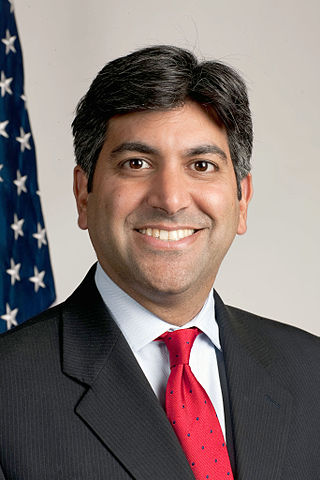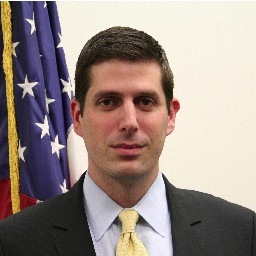
The National Telecommunications and Information Administration (NTIA) is an agency of the United States Department of Commerce that serves as the president's principal adviser on telecommunications policies pertaining to the United States' economic and technological advancement and to regulation of the telecommunications industry.

The National Technical Information Service (NTIS) is an agency within the U.S. Department of Commerce. The primary mission of NTIS is to collect and organize scientific, technical, engineering, and business information generated by U.S. government-sponsored research and development, for private industry, government, academia, and the public. The systems, equipment, financial structure, and specialized staff skills that NTIS maintains to undertake its primary mission allow it to provide assistance to other agencies requiring such specialized resources.

The energy policy of the United States is determined by federal, state, and local entities. It addresses issues of energy production, distribution, consumption, and modes of use, such as building codes, mileage standards, and commuting policies. Energy policy may be addressed via legislation, regulation, court decisions, public participation, and other techniques.
Open government is the governing doctrine which maintains that citizens have the right to access the documents and proceedings of the government to allow for effective public oversight. In its broadest construction, it opposes reason of state and other considerations which have tended to legitimize extensive state secrecy. The origins of open-government arguments can be dated to the time of the European Age of Enlightenment, when philosophers debated the proper construction of a then nascent democratic society. It is also increasingly being associated with the concept of democratic reform. The United Nations Sustainable Development Goal 16 for example advocates for public access to information as a criterion for ensuring accountable and inclusive institutions.

According to data from the US Energy Information Administration, renewable energy accounted for 8.4% of total primary energy production and 21% of total utility-scale electricity generation in the United States in 2022.

Vivek Kundra is a former American administrator who served as the first chief information officer of the United States from March, 2009 to August, 2011 under President Barack Obama. He is currently the chief operating officer at Sprinklr, a provider of enterprise customer experience management software based in NYC. He was previously a visiting Fellow at Harvard University.

Data.gov is a U.S. Government website launched in late May 2009 by the Federal Chief Information Officer (CIO) of the United States, Vivek Kundra. Data.gov aims to improve public access to high value, machine-readable datasets generated by the Executive Branch of the Federal Government. The site is a repository for Federal, state, local, and tribal government information made available to the public.

Aneesh Paul Chopra is an American executive who served as the first Chief Technology Officer of the United States. He was appointed in 2009 by President Barack Obama and was at the White House through 2012. Chopra previously served as Virginia's Secretary of Technology under Governor Tim Kaine. Chopra was a candidate in 2013 for the Democratic nomination for Lieutenant Governor of Virginia. He is the author of Innovative State: How New Technologies Can Transform Government (2014) and co-founder and president of CareJourney. In 2015 he joined Albright Stonebridge Group as a senior advisor.
The United States Chief Technology Officer is an official in the Office of Science and Technology Policy. The U.S. CTO helps the President and their team harness the power of technology and data to benefit all Americans. The CTO works closely with others both across and outside government on a broad range of work including bringing technology expertise to bear on federal policy and programs, and promoting values-driven technological innovation. The CTO and their team have historically focused on leveraging technology and technical expertise to help create jobs, strengthen privacy protections, harness the benefits and mitigate the risks of artificial intelligence, create paths to improve government services with lower costs, higher quality and increased transparency and accessibility, help upgrade agencies to use open data and expand their data science capabilities, improve quality and reduce the costs of health care and criminal justice, increase access to broadband, bring technical talent into government for policy and modern operations input, improve community innovation engagement by agencies working on local challenges, and help keep the nation secure.

The federal Chief Information Officer of the United States, also known as the United States Chief Information Officer, is the administrator of the Office of Electronic Government, or the Office of the Federal CIO (OFCIO), which is part of the Office of Management and Budget. The President appoints the Federal CIO. The appointee does not require Senate confirmation. It was created by the E-Government Act of 2002.
The Office of Social Innovation and Civic Participation was an office new to the Obama Administration, created within the White House, to catalyze new and innovative ways of encouraging government to do business differently. Its first director was the economist Sonal Shah. The final director was David Wilkinson.
Citizen sourcing is the government adoption of crowdsourcing techniques for the purposes of (1) enlisting citizens in the design and execution of government services and (2) tapping into the citizenry's collective intelligence for solutions and situational awareness. Applications of citizen sourcing include:

Lasting from November 15, 2010 to November 17, 2010, The International Open Government Data Conference was a conference sponsored by the United States General Services Administration and hosted by the United States Department of Commerce on the subject of open datasets globally, in coalition with the United States' previously opened data.gov.

Nick Sinai is a venture capitalist, adjunct faculty at Harvard Kennedy School, author, and a former senior official in the Obama Administration.

The Digital Accountability and Transparency Act of 2014 is a law that aims to make information on federal expenditures more easily accessible and transparent. The law requires the U.S. Department of the Treasury to establish common standards for financial data provided by all government agencies and to expand the amount of data that agencies must provide to the government website, USASpending. The goal of the law is to improve the ability of Americans to track and understand how the government is spending their tax dollars.

Open Data Now is a 2014 book on open data by Joel Gurin.
Apps.gov was a cloud storefront run by the U.S. General Services Administration to assist federal agencies in purchasing cloud computing services from the marketplace. The website was initially launched in 2009 under the direction of former Federal Chief Information Officer Vivek Kundra, but was first closed down in 2012 in order to "streamline" procurement and amid reports of low usage. The service was relaunched at the 2016 SXSW festival by a team of Presidential Innovation Fellows following President Obama's keynote address on using technology to improve government. The site has not been available since early 2019, though no official shutdown was ever announced.
Open by Default, as widely used in the contexts of Open Government and Open Data, is the principle in which government makes its data accessible to the public by default, unless there is a sufficient justification to explain that greater public interest may be at stake, as a result of disclosure. Since the principle empowers the public's right to know and capacity to oversee government activities, it is closely associated with government transparency, civic engagement, and e-governance in organizing public life. In many cases, the principle is accompanied with the technological commitment to create "metadata standardization for all datasets, publication of a machine-readable data catalogue or inventory of both released and to-be released datasets ... (and) use of open licenses."
The People's Code is an ongoing open source project that aims to make all US Federal agencies and departments utilize open source software, (OSS), for their platforms, at a pilot minimum of 20% open source. In so doing, Federal departments and agencies can be more transparent with the work they do. Software can eventually be streamlined across all agencies, and people can begin to make suggestions on how to improve the code and policy these departments work on. The belief that citizens should have this information available and open to them, is the idea behind what the Obama administration coined as the, People's Code.
The Union Cabinet of India approved the National Data Sharing and Accessibility Policy (NDSAP) on 9 February 2012. The objective of the policy is to facilitate access to Government of India owned shareable data and information in both human readable and machine readable forms.












